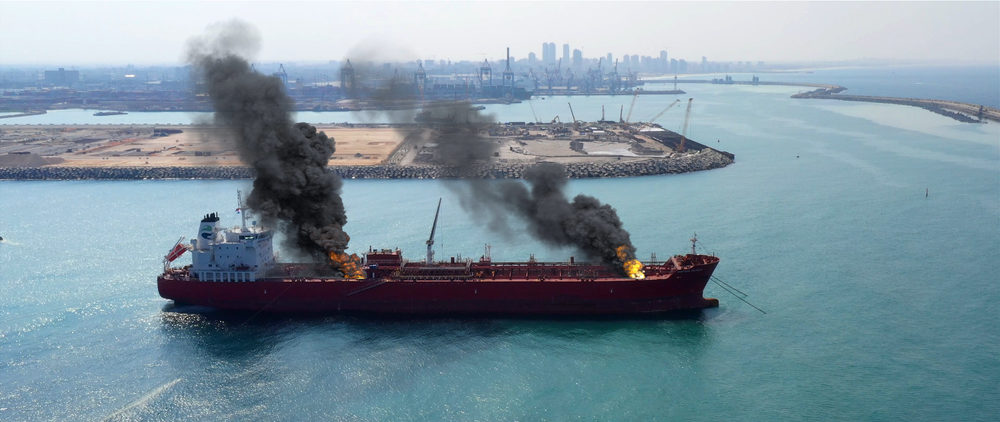
Three crew members are missing after an oil tanker explosion in the Sea of Azov. Officials continue to investigate what caused this maritime accident as rescue crews search for the missing crew members. Here is what we know so far.
Russian Oil Tanker Explosion Under Investigation
According to ABC News, the oil tanker explosion occurred while the ship, the General Azi Aslanov, we enroute from Kavkaz to Rostov-on-Don. Russian authorities say that there were 13 crew members onboard when the explosion happened. Ten were rescued, and three are still missing. The search is still underway.
A spokesperson said that there was no fire with the blast, just a sudden blast that was powerful enough to tear apart the metal on the ship. Immediately after the oil tanker explosion, the ship was tilting and efforts were made to stabilize it. Investigators say that the tanker was not loaded at the time.
Investigators believe that flammable vapors may have been left behind after the ship was unloaded. Crew members performing “hot work” may have caused the vapors to ignite. Investigators are considering safety violations as a potential cause.
Oil Tanker Explosion Highlights Dangers of Explosions at Sea
While the exact cause of this oil tanker explosion is unclear, this maritime accident highlights the dangers of explosions at sea. Generally, a fire or explosion should never occur while a ship is at sea. When a fire or explosion does happen, it is usually the result of:
- Improper construction
- Unseaworthiness
- Poor maintenance
- Lack of proper training
- Safety violations
- Malfunctioning parts
Many ships carry flammable materials, especially tankers. Even when they are empty, there is still the risk of igniting a fire or causing an explosion. This is why crew members must be properly trained and why they must follow safety protocols. The results of an explosion at sea can be catastrophic.
Injuries in Maritime Explosions
When a fire breaks out or an explosion occurs, maritime workers can be seriously injured or even killed. Depending on the severity of the incident and crew member locations, injuries can range in their severity. Some examples of maritime explosion injuries include:
Burns
Explosions can cause serious burn injuries, including dangerous third-degree burns or worse.
Infections
Burn injuries often affect several layers of skin, which puts the patient at risk for infection.
Scarring or Disfigurement
Explosion injuries may require skin grafts or reconstructive surgery. This can result in scarring or disfigurement on the affect part of the body.
Lung Damage
Inhaling smoke or toxic chemical fumes during and after a fire or explosion can cause lung damage, including long-term lung conditions like asthma.
Eye Injuries
Explosions and fires can cause temporary loss of eyesight, sensitivity to light and permanent blindness.
Nerve Damage
Nerve fibers may be damaged in an explosion. This can lead to pain, numbness, tingling, itching or complete loss of sensation.
Amputation
Direct contact with an explosion can cause an individual to lose an arm or leg in the blast itself. Also, if the injuries to an arm or leg are severe enough, the patient may require amputation to prevent infection.
Psychological Injuries
There is certainly a risk for psychological trauma for maritime workers who suffer injuries due to an explosion. Such a traumatic event can lead to post-traumatic stress disorder (PTSD), depression and anxiety. This is especially true in cases where there is permanent disability or disfigurement.
Death
Unfortunately, many maritime fires and explosions result in death for nearby crew members. Sometimes death is the result of the explosion itself, but it can also be caused by drowning, falling objects and other related events.
Any of these injuries can have a significant impact on the maritime worker and his or her family. While the oil tanker explosion discussed above is catastrophic, maritime workers don’t have to be on a huge ship in order for an explosion to be life-changing. Even smaller vessels can experience fires or explosions that cause injuries or death.
Getting Help after a Maritime Accident
If you or someone you love has been injured in a maritime accident, there is hope. Maritime laws exist to help ensure that maritime workers receive compensation for injuries that occur at sea. Maritime workers can receive maintenance and cure benefits, which provides compensation for medical expenses and day-to-day living expenses.
The Jones Act protects seamen who are injured while on navigable waters. This law provides maritime workers with compensation for their injuries and related losses. The Jones Act applies to fishermen, engineers, captains, mates, pilots, divers and more.
For families who have lost a maritime worker in an explosion or other accident, there is the Death on the High Seas Act (DOHSA). This law provides families with compensation for their loss when the death was the result of a negligent vessel owner. Families can receive compensation for funeral costs, loss of financial support and other financial costs.
Maritime workers and their families can learn more about these laws and their legal rights by contacting a maritime lawyer at Maritime Injury Guide. Contact us today for a free injury consultation by calling 866-871-8422. We can help you explore your rights and options for recovery.
Sources: